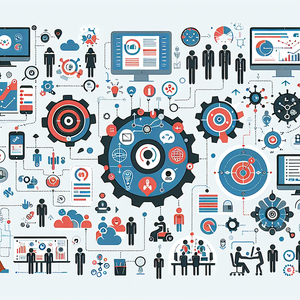The Role of AI in Shaping Future Job Markets

AI is fundamentally altering the way businesses operate across various sectors. Its capabilities in processing and analyzing large datasets enable organizations to improve efficiency, accuracy, and decision-making.
Case Studies Across Industries
1. Healthcare: AI algorithms can analyze medical images with remarkable precision, leading to earlier detection of conditions like cancer. For example, Google's DeepMind has developed AI that can detect over 50 eye diseases as accurately as expert ophthalmologists. This not only improves patient outcomes but also allows healthcare professionals to focus on patient care rather than administrative tasks. 2. Finance: In the finance sector, AI tools are being leveraged for real-time fraud detection and risk management. Companies like PayPal utilize machine learning algorithms to analyze transaction patterns, identifying anomalies that could indicate fraudulent activity. This not only protects customers but also streamlines operations, minimizing losses for businesses. 3. Manufacturing: AI-driven robots are revolutionizing manufacturing processes by performing repetitive tasks with high precision. Companies like Siemens are implementing AI in predictive maintenance, reducing downtime and operational costs by anticipating equipment failures before they occur. 4. Creative Industries: AI is also making strides in creative sectors, with tools such as OpenAI's ChatGPT and DALL-E enabling content creation and design automation. These technologies empower creators to enhance their work, allowing for greater focus on innovation and artistry.
Emerging Job Roles
As AI becomes more integrated into work environments, new job roles are surfacing to meet evolving demands. Here are some key positions expected to see growth: 1. AI Ethicist: With the rise of AI comes the responsibility to address ethical concerns. AI ethicists will ensure that AI systems are developed and deployed responsibly, considering issues of bias, privacy, and accountability. 2. Data Scientists: The role of data scientists will continue to expand as organizations require experts who can derive meaningful insights from complex datasets. These professionals will bridge the gap between data and strategic decision-making. 3. AI Trainers: AI systems must be trained to function optimally. AI trainers will play a crucial role in teaching algorithms how to perform tasks accurately, requiring a combination of technical expertise and domain knowledge. 4. Automation Managers: As companies adopt automation tools, automation managers will oversee the integration of these technologies, ensuring that they enhance productivity without disrupting workflows. 5. Cybersecurity Specialists: With the increasing reliance on AI, safeguarding these systems from cyber threats is paramount. Cybersecurity specialists will work to protect AI infrastructure, ensuring data integrity and security.
Preparing for the Future Workforce
To thrive in an AI-driven job market, individuals must proactively develop the skills and competencies that will be in demand.
Strategies for Success
- Embrace Lifelong Learning: The rapid pace of technological change necessitates a commitment to continuous education. Enrolling in online courses, attending workshops, or pursuing advanced degrees can help individuals stay ahead of the curve. - Develop Technical Skills: Familiarity with programming languages (such as Python or R) and AI tools will provide a competitive edge. Understanding machine learning concepts and data analysis techniques is essential for many emerging roles. - Cultivate Soft Skills: As AI takes on more routine tasks, soft skills like creativity, emotional intelligence, and critical thinking will become increasingly valuable. These skills foster collaboration and innovation, complementing AI capabilities. - Network and Collaborate: Building connections within the AI and technology sectors can provide insights into industry trends and emerging opportunities. Participating in professional groups, attending conferences, and engaging in online communities can facilitate valuable relationships.
The integration of AI into various industries is not merely a trend but a profound shift that is reshaping the job market. While some traditional roles may be diminished, new opportunities are emerging, creating a landscape rich with potential for those willing to adapt. By understanding the transformative effects of AI and proactively preparing for the future workforce, individuals can position themselves for success in this evolving environment. Embracing lifelong learning, developing both technical and soft skills, and actively engaging with industry networks will be critical strategies for navigating this exciting yet uncertain future. The job market may be changing, but it also holds immense promise for those who are prepared to embrace it.
AI Ethicist
Technology firms (e.g., Google, Microsoft), research institutions, and regulatory bodies
Job Description
Ensure the ethical design and deployment of AI systems by evaluating and addressing potential biases and ethical implications.
Collaborate with data scientists and AI developers to create guidelines that promote fairness, accountability, and transparency in AI applications.
Conduct research on AI's societal impact, including privacy concerns and regulatory compliance.
Skills Required
Strong understanding of AI technologies, ethics, and law
Excellent communication and analytical skills
Data Scientist (Machine Learning Specialist)
Financial institutions (e.g., JPMorgan Chase), tech companies (e.g., Amazon, Facebook), and healthcare organizations
Job Description
Analyze large datasets to extract actionable insights and develop predictive models using machine learning algorithms.
Collaborate with cross-functional teams to identify business challenges and provide data-driven solutions.
Create visualizations and reports that communicate complex findings to non-technical stakeholders.
Skills Required
Proficiency in programming languages (Python, R)
Experience with machine learning frameworks (TensorFlow, PyTorch)
Strong statistical analysis skills
AI Trainer
E-commerce platforms (e.g., eBay), AI startups, and educational technology companies
Job Description
Develop training datasets and provide input for model training, ensuring AI algorithms learn accurately from real-world scenarios.
Collaborate with subject matter experts to enhance AI performance through iterative training and feedback.
Monitor AI system performance and make adjustments as necessary to improve accuracy and efficiency.
Skills Required
Strong understanding of machine learning principles
Domain-specific knowledge
Experience in data curation
Automation Manager
Manufacturing firms (e.g., General Motors), logistics companies (e.g., FedEx), and software development companies
Job Description
Oversee the implementation of automation technologies within business processes to enhance efficiency and productivity.
Evaluate existing workflows and identify opportunities for automation, ensuring minimal disruption to operations.
Collaborate with IT and operations teams to integrate automation solutions and monitor their performance.
Skills Required
Project management experience
Knowledge of automation tools (e.g., UiPath, Blue Prism)
Strong problem-solving abilities
Cybersecurity Specialist (AI Infrastructure)
Financial institutions (e.g., Bank of America), tech companies (e.g., IBM), and government agencies
Job Description
Protect AI systems from cyber threats by implementing security measures and monitoring for vulnerabilities.
Conduct risk assessments and develop strategies to safeguard data integrity and privacy in AI applications.
Work closely with AI development teams to ensure security best practices are integrated into the AI lifecycle.
Skills Required
Expertise in cybersecurity protocols
Familiarity with AI technologies
Knowledge of ethical hacking techniques


